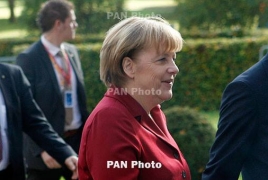Merkel, Hollande call for unified response to biggest migrant crisis August 25, 2015 - 13:11 AMT PanARMENIAN.Net - A new wave of migrants began entering the European Union from Serbia Monday, Aug 24, as the leaders of France and Germany called for a unified response to the continent's biggest migrant crisis since World War II, AFP reports. "We must put in place a unified system for the right to asylum," French President Francois Hollande said in a brief statement ahead of talks with German Chancellor Angela Merkel, calling the influx from the world's crisis zones "an exceptional situation that will last for some time". "Rather than wait, we should organize and reinforce our policies, and that is what France and Germany are proposing," Hollande said, according to AFP. More than 1,000 migrants and refugees arrived in EU member Hungary late on Monday, the first in a wave of about 7,000 people who found their gruelling journey to Europe blocked last week, when Macedonia declared a state of emergency and closed its Greek border for three days. Germany, which expects to take in 800,000 asylum seekers in 2015, saw anti-migrant sentiment rear its head over the weekend as violent protests erupted against a refugee home, provoking anger from Merkel. "It is vile for far-right extremists and neo-Nazis to try to spread their hollow, hateful propaganda but it is just as shameful for citizens including families with children to join them" in the protests, said Merkel in her strongest statement to date against a wave of anti-refugee protests to hit eastern Germany. EU border agency Frontex said last week that a record 107,000 migrants were at the bloc's borders last month, with 20,800 arriving in Greece last week alone. Following the wave of 7,000, at least 2,000 more migrants poured into Serbia from Macedonia overnight from Sunday to Monday, intent on heading north through Hungary to more prosperous European countries such as Germany or Sweden. Macedonian police last week used stun grenades and batons to stop hundreds of refugees trying to break through barbed wire fencing before apparently deciding to let everyone enter. With asylum-seekers coming not just from war zones such as Syria but also from countries without military conflict in southeastern Europe, Hollande and Merkel reiterated their calls for Brussels to draw up a list of safe countries of origin, AFP says. Germany in particular sees this as a priority, as 40 percent of its asylum-seekers come from countries such as Albania and Kosovo. Merkel is travelling Thursday to Vienna, where she will meet Balkan leaders to find out why "so many thousands of people are coming from these countries", her spokesman Steffen Seibert said. Other coordinated action sought by Hollande and Merkel includes the rapid setting up of reception centres in overwhelmed Greece and Italy -- two countries that have borne the brunt of the crisis -- to help identify asylum-seekers and illegal migrants. Merkel stressed that the centres must be set up at the first ports of call to be administered and staffed by the EU as a whole by the end of the year. "We cannot tolerate a delay," she said. Azerbaijani authorities report that they have already resettled 3,000 people in the Nagorno-Karabakh town of Stepanakert. On June 10, Azerbaijani President of Azerbaijan Ilham Aliyev will leave for Turkey on a working visit. Azerbaijani President Ilham Aliyev arrived in Moscow on April 22 to hold talks with Russian counterpart Vladimir Putin. Authorities said a total of 192 Azerbaijani troops were killed and 511 were wounded during Azerbaijan’s offensive. Partner news |